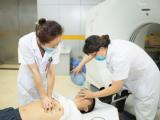South Korea's health ministry today reported 14 more MERS-CoV cases today, putting the hospital outbreak at 122 cases, as more pieces of the risk puzzle came into focus amid new worries about spread of the virus outside hospital settings.
Health officials also reported the tenth death in the outbreak, in a 65-year-old man who had advanced cancer, according to Korean media reports, which said 3,805 contacts are being monitored.
In addition, the number of health facilities affected by the outbreak grew to 55, according to a ministry report posted by the World Health Organization (WHO) today. Yesterday, 36 facilities were on the list of affected sites. Nine are hospitals and clinics where confirmed MERS-CoV (Middle East respiratory syndrome coronavirus) patients were exposed to the virus, and 46 are facilities that confirmed case-patients visited before they were isolated.
Concern over non-hospital exposure
Eight of newest lab-confirmed MERS patients had visited Samsung Medical Center in Seoul, one of the outbreak's two main hot spots, Yonhap News reported today. Another was infected at a hospital about 50 miles south of Seoul.
Exposures weren't clear for five patients, however, the Korea Herald reported today. That development is notable because until now, all of the cases involved hospital settings and had clear epidemiologic links to the index patient, a 68-year-old man who got sick after returning from a trip to four Middle Eastern countries.
One of the five is a 35-year-old policeman who was released after testing negative for MERS-CoV on Jun 3 but was readmitted to the hospital 2 days later when his symptoms worsened. He then tested positive for the disease, according to the Herald.
The man had been in Seoul, Gyeonggi province, and South Chungcheong province since May 31, when he had his first symptoms. He also had used public transportation.
Another patient with an unclear picture is a 77-year-old woman who was seen in an outpatient orthopedic clinic at Samsung Medical Center in Seoul, the Korea Times reported today. The report said 54 other confirmed MERS-CoV cases involve people who were in the hospital's emergency department (ED) and that the woman appears to be the facility's first infection outside of that setting.
According to earlier reports, a patient who was sickened at a hospital in Pyeongtaek—where the index patient was treated—later sought care at Samsung Medical Center, which triggered a cluster of illnesses.
Earlier this week a WHO expert said authorities wouldn't be surprised if a few community cases were seen, given the large number of hospitals and contacts, and that such a development wouldn't signal a dramatic change in the outbreak.
Emergency department exposures
More details emerged today about the man's visit to Samsung's ED and how an extremely long wait time may have played a role in exposing a large number of people to MERS-CoV. Reuters reported that he waited more than 2 days in the ED for a bed to open at the hospital, which may have exposed nearly 900 staff, visitors, and patients who were in the ED during that time.
He arrived on May 27 with pneumonia symptoms but wasn't considered a MERS risk, because he didn't have a history of travel to the Middle East, according to the report. Samsung Medical Center didn't move him from the ED until May 29, when they learned the man had been exposed to the index patient in the Pyeongtaek hospital.
The report said the long ED wait isn't unusual for Seoul's top medical centers. It added that another factor that might be contributing to the spread in South Korean hospitals is the practice of lengthy family visits to care for loved ones.
One of the patients infected in the ED is a pregnant woman who went to the facility to visit her mother, who was waiting to be seen for an upset stomach, Reuters reported. The story said the pregnant woman's parents are among the patients infected with MERS-CoV at Samsung's ED.
CDC to update guidance
Developments surrounding MERS-CoV in South Korea and the Middle East continue to reverberate across the globe, with experts from the US Centers for Disease Control and Prevention (CDC) today hosting a teleconference with clinicians to keep them posted on the disease and the latest guidance.
The CDC has already updated its testing recommendations to include travelers from South Korea who have severe respiratory infections, especially those who had exposure to healthcare settings in the 14 days before illness onset.
Susan Gerber, MD, team lead of the division of viral diseases at the CDC's National Center for Emerging and Zoonotic Infectious Diseases (NCEZID), urged health providers to not wait for other possible causes to be sorted out before testing for MERS-CoV. She added that the CDC recommends obtaining multiple specimens, including nasopharyngeal, oropharyngeal, serum, and—if possible—lower respiratory samples.
She emphasized that the most important details to collect for any patient under investigation are travel history with dates, information about healthcare exposure, and date of symptom onset.
David Kuhar, MD, a medical officer with the CDC's NCEZID, said the CDC will be releasing expanded infection control guidance shortly that will include steps to minimize exposure before, during, and after triage and processes for monitoring and educating health facility visitors.
CDC HAN advisory
In a related development, the CDC issued a Health Alert Network (HAN) advisory to providers today about continuing MERS-CoV activity in the Middle East and its spread to South Korea and China and its latest recommendations for identifying illnesses and preventing the spread of the virus in the United States.
Two cases have already been detected in the United States, both in 2014—one in Indiana and one in Florida.
See also:
Jun 11 Yonhap story on new cases
WHO Western Pacific regional office MERS-CoV page
Jun 11 Korea Herald story on 10th death
Jun 11 Korea Times story on outpatient case
Jun 11 Reuters story
CDC MERS-CoV COCA call information
Jun 11 CDC HAN notice on MERS-CoV
Jun 9 CIDRAP News story "South Korea reports 8 more MERS cases, 1 fatal"






















